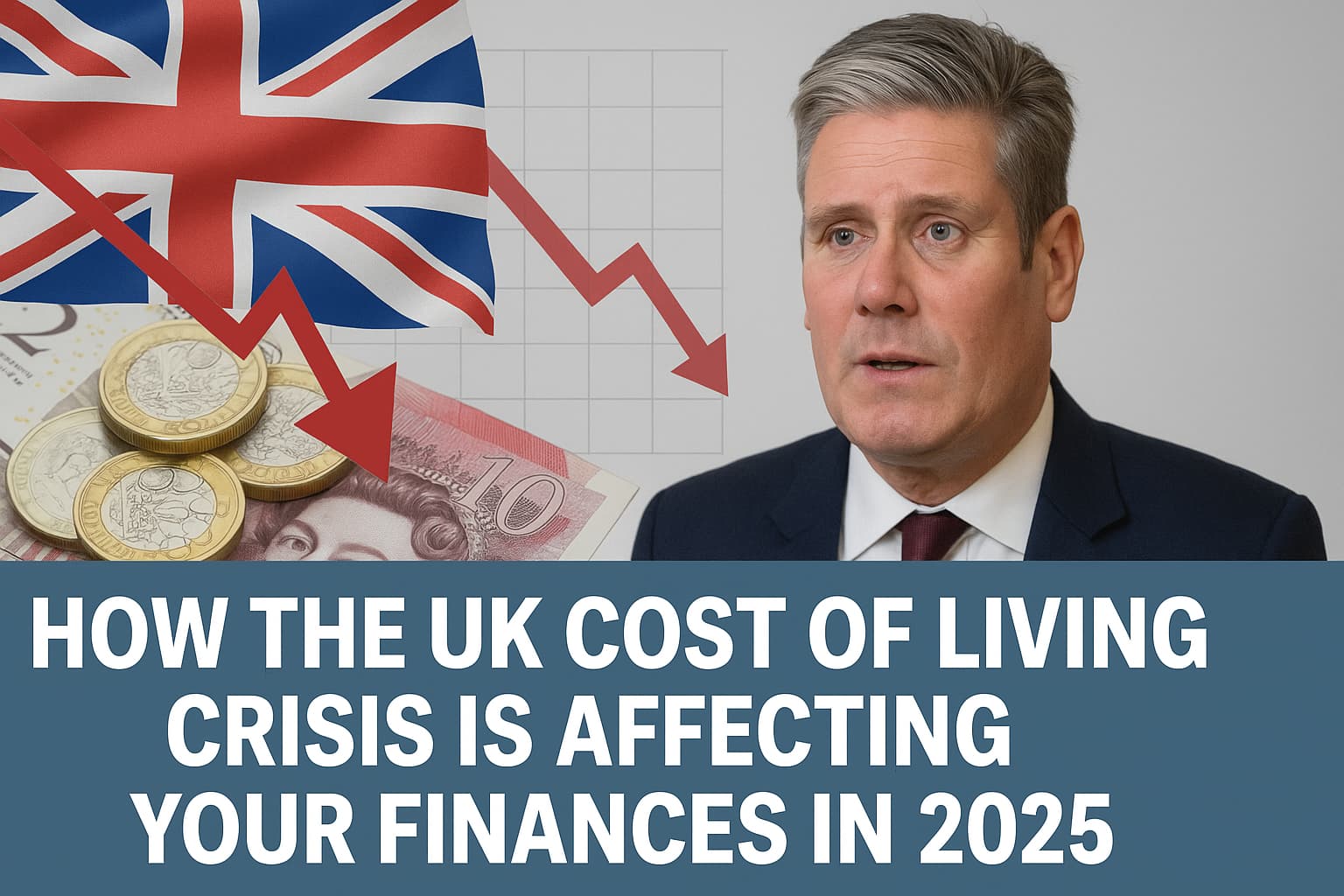The UK cost of living crisis continues to strain household budgets in 2025, with inflationary pressures, stagnant wages, and rising energy prices hitting consumers hard. From food to fuel, the cost of everyday essentials has surged, leaving many struggling to keep up. Here’s a detailed look at how this crisis is impacting your personal finances and what options are available to ease the burden.

Rising Inflation in the UK: What It Means for Your Wallet
The inflation UK 2025 rate remains stubbornly high, fluctuating between 5% and 6%, significantly above the Bank of England’s 2% target. This persistent inflation is driven by:
- Supply chain disruptions from geopolitical tensions and post-Brexit trade complications
- Increased energy prices due to reduced domestic production and higher global demand
- Currency depreciation, making imports more expensive
These inflationary forces reduce the purchasing power of your income. For example, if your salary increased by 3% this year, but inflation is at 6%, you’re effectively earning less.
Everyday Costs That Are Draining UK Households
Let’s break down how specific expenses have changed in 2025:
| Expense Category | Average Monthly Cost (2024) | Average Monthly Cost (2025) | Percentage Increase |
|---|---|---|---|
| Groceries | £300 | £360 | 20% |
| Energy Bills | £180 | £225 | 25% |
| Rent (1-bed flat) | £850 | £910 | 7% |
| Public Transport | £75 | £90 | 20% |
These increases disproportionately affect low- and middle-income households, who spend a larger share of their income on essentials.
Struggles with Debt and Credit
As wages fail to keep pace with costs, many turn to credit cards and loans to bridge the gap. However, high interest rates make this a risky solution. In 2025, average credit card APRs have risen to over 23%, pushing borrowers further into debt.
Additionally, more households are missing payments on mortgages, utilities, and council tax, which can damage credit scores and lead to legal consequences. It’s a dangerous cycle: borrowing to survive, then struggling with repayments.
Financial Help UK: Support Schemes and Resources
The government has introduced several financial help UK programs aimed at softening the blow. Here are some key support options available in 2025:
- Energy Price Guarantee Extension: Capping household energy bills at an average of £2,000 per year
- Cost of Living Payments: Targeted one-off payments for low-income and vulnerable households
- Universal Credit Adjustments: Higher payment thresholds and expanded eligibility
- Local Council Support Funds: Emergency grants for rent arrears and food assistance
However, many critics argue that these measures are not keeping up with the scale of the crisis, and awareness of available support remains low.
Impact on Savings and Future Planning
The cost of living crisis has also delayed or derailed long-term financial goals for many. Here’s how:
- Retirement contributions are being paused or reduced as people prioritize current expenses.
- First-time home buyers are postponing plans due to inflated housing costs and stricter mortgage criteria.
- Emergency savings are being depleted, leaving households more vulnerable to unexpected expenses like car repairs or medical bills.
These decisions have long-term consequences that will extend well beyond 2025.
Practical Steps to Navigate the Crisis
Even in challenging times, there are strategies that can help:
- Create a detailed monthly budget to track spending and identify areas to cut back.
- Shop smarter by comparing supermarket prices, using loyalty programs, and avoiding waste.
- Check eligibility for government and local authority support schemes.
- Negotiate bills and contracts, especially with broadband, mobile, and insurance providers.
- Speak to a financial adviser if you’re struggling with debt or major financial decisions.
The UK cost of living crisis is more than just a headline. It’s reshaping how people live, save, and plan for the future. While inflation and economic uncertainty continue to pose serious challenges, knowing your options and making informed choices can offer some relief.
FAQs
Q1: Why is the UK cost of living crisis still happening in 2025?
Ongoing global supply issues, energy price shocks, and domestic policy decisions have prolonged the crisis. The effects of Brexit and high inflation are compounding these problems.
Q2: Where can I find financial help in the UK?
You can access support through GOV.UK, Citizens Advice, and local councils. These sources offer help with energy bills, food, rent, and debt management.
Q3: How can I protect my finances during this crisis?
Budget carefully, avoid high-interest borrowing when possible, seek professional financial advice, and explore all available government and charity support options.
Click here to know more about it.
Kishan is a knowledgeable writer specializing in agriculture and the latest government job recruitments, delivering clear and insightful content to inform and empower readers.
